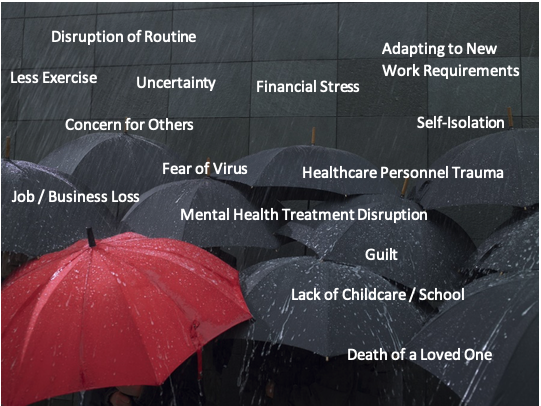Mental health is extremely important, but rarely discussed. According to the National Alliance on Mental Illness (NAMI), one in five individuals will experience some type of mental illness each year. Think about your family, friends, co-workers and acquaintances. Now picture 20% of those people will experience some type of mental illness this year.
When left untreated and coupled with internal and external stressors, physical changes, addiction and/or trauma, mental illness can lead to a variety of negative impacts. This may include everything from strained relationships to poor work performance to hospitalization and, in the case of approximately 43,000 Americans annually, to suicide. According to the CDC, suicide is the 10th leading cause of death in the United States. This is up 35% from 1999 according to the CDC. The percentage of adults reporting serious thoughts of suicide in 2019 is over 4%.

May is Mental Health Awareness month, which comes at a time when many individuals are in crisis. COVID-19 has created an increased amount of uncertainty, stress, fear, anxiety, trauma, life changes and overall social isolation. To some, this is a perfect storm to create or advance mental health illnesses with many triggers.
There is a bright side though. Each of us can play an important role in helping others and ourselves weather this storm. Based on experience, here is a list of what individuals, co-workers, and employers can do to help themselves and others during this time.
Individuals
The most important thing you can do to help yourself is to practice self-care.
- Stay active: Exercise, take walks, do yoga, stretch or anything to get your body moving.
- Meditate: Breathe in and out and focus on pushing away negative thoughts and welcoming in positive.
- Maintain some type of routine: Small examples include taking a shower, getting dressed, setting a set schedule for activities, and planning to achieve one goal each day (even if this is just getting out of bed in the morning for those suffering deeply from depression).
- Find positive activities to focus on: Read a book, watch a TV show, go biking, do a puzzle, learn a new hobby, etc.
Another important thing is to leverage technology to stay connected, but being intentional about it for your digital wellbeing:
Whoever you are, and especially if you are doing difficult emotional work, be sure to schedule pleasure and positive activities into your days and weeks.
— Dennis Tirch PhD (@DennisTirchPhD) January 25, 2019
- Stay connected to your support system: Call or text a friend or family member just to talk.
- Leverage free online support groups: Connect to others that may provide added support. For instance, Inspire created a forum for individuals impacted by COVID-19 to connect and share their concerns.
- Leverage virtual or telephone appointments to connect to mental health professionals: Use technology to conduct tele-health appointments. Currently, there are numerous free resources available for those without or lacking sufficient health care insurance.
- Limit your viewing of media: Viewing media coverage to stay connected with current events is important, but, especially now, can be overwhelming at times. So, limit your doses of TV, talk radio, and other forms of media.
- Limit your time on social media channels: Scientists have linked overuse of social media to internet addiction which has been correlated with high levels of anxiety, ADHD, and depression. Use digital wellbeing apps, which are available on most smart phones, to limit screen time.
Above all, keep in mind—you are not alone, and if some of these are hard given your current state, do not beat yourself up. Take it one day at a time.
Protect your self care time.
— Dahlia (@Dahlia_pdf) May 14, 2020
Protect your mental health.
Protect your physical health.
Protect your well being.
Co-Workers
As a co-worker you can greatly support others through compassion, patience, and empathy. Be kind to one another. Keep in mind that:
- Everyone reacts differently to stressful situations.
- Everyone’s experiences right now are not the same as your own.
- Do not assume you understand the challenges others are facing.
- Mental health disorders are real illnesses.
To support others:
- Check-in occasionally to see how your co-workers are doing personally. A simple, sincere “How are you doing?” and/or “Anything I can help you with?” goes a long way.
- Be patient. Some of your co-workers may be facing tremendous challenges right now outside of work, such as assuming caregiving responsibilities during their workday or working in non-ideal settings.
- Educate yourself on mental illness and help build awareness to break stigmas.
Everyone reacts differently to stressful situations. And the fear and anxiety resulting from the recent outbreak of COVID-19 can be extremely overwhelming.
— Kevin Love (@kevinlove) March 12, 2020
Through the game of basketball, we've been able to… https://t.co/TPRULTtHor
Employers
Lastly, I would be remised if I did not point out what employers can do to support the health of their staff during this time. As leaders, we can:
- Be honest about uncertainties, but be reassuring and compassionate to employees.
- Be flexible and reasonable with expectations given the new challenges your staff may be faced with.
- Be advocates and make it known that each employee’s mental health is important to the company.
- Provide employees with resources to seek help through employee assistance programs or other mechanisms for mental health, substance use disorders and financial counseling.
- Provide training to managers to recognize when employees are at risk.
As a part of our ongoing commitment to support partners (employees) mental health, Starbucks will provide all U.S. partners and eligible family members access to 20 sessions a year with a mental health therapist or coach through @LyraHealth. https://t.co/aWXmlJ6rZe
— Starbucks News (@StarbucksNews) March 16, 2020
Resources
If you or a love one is thinking of suicide, please call 800-273-TALK to reach someone at the National Suicide Prevention Lifeline crisis center.

If you wish to learn more or find out about other ways you can support through volunteering, advocacy, and/or monetary donations, here is a list of recommended non-profit organizations:






